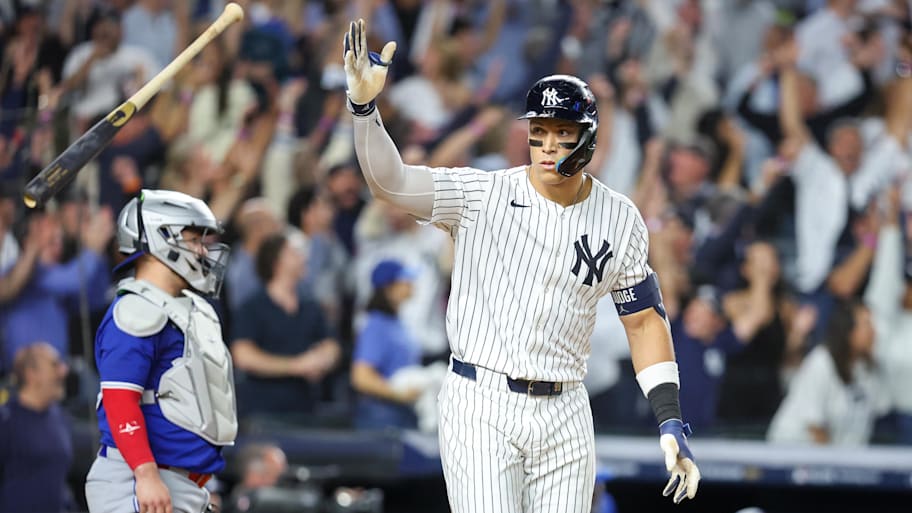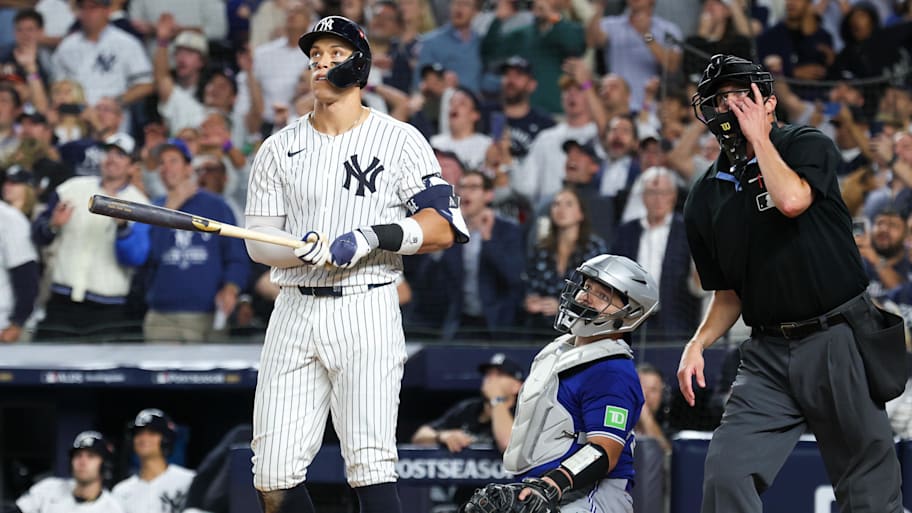
NEW YORK — He heard the boos in 2022, when he followed his American League MVP season with seven strikeouts in the first two games of the division series. He heard the gasps of his teammates when the Guardians intentionally walked Juan Soto to face him in the DS last year. He heard the questions over the last three years about whether, after carrying his teammates to October every year, he was letting them down when they got there.
On Tuesday, as he watched his rocket to left field to see whether it would stay fair, save the Yankees’ season and rewrite his postseason legacy, Aaron Judge heard only silence.
“You just got so much adrenaline pumping and you’re so locked in on the moment,” he said. The noise only turned back on for him as he rounded third base to tie a game the Yankees would win 9–6 to stave off elimination and force Game 4 of the ALDS against the Blue Jays. Toronto had led Game 3 6–1 in the top of the third; the comeback was tied for the second largest in MLB history to avoid postseason elimination, and also tied the second-largest postseason comeback in franchise history.
The moment was both impossible and inevitable. The question surrounding Judge most of this year was not whether he would win his third AL MVP award in four years (almost certainly yes) but whether he would finally play to his talent level in the postseason (much less clear). He has always rejected that narrative, but ignoring it has not made it go away. Only producing moments like he did on Tuesday can do that.
AARON JUDGE TIES IT UP!
— Sports Illustrated (@SInow) October 8, 2025
(via @MLB) pic.twitter.com/vRMXbZcqsU
Just before the chaos, there was that instant of stillness, as Judge at the plate, Toronto reliever Louis Varland on the mound, Trent Grisham at first base and Austin Wells at second all wondered if this would be just another missed opportunity. “I felt like I made good contact, and I thought we had a chance,” Judge said. “You just never know with the wind, if it's going to push it foul, going to keep curving or not. But I guess a couple ghosts out there helped kind of keep that fair.”
Ghosts and wrists, perhaps. Even if the moment had been lesser, the shot would still have been impressive: It came off a 99.7-mph fastball 1.2 feet from the center of the plate, almost at his elbows. It was the first time since MLB began tracking such things in 2008 that a hitter homered off a pitch thrown so hard and also so far inside. Considering how much velocity has increased in recent years, there’s a good chance it’s the first time in MLB history.
No one who has ever tried to do that could believe it.
“It would be in the catcher’s glove if I tried to do that,” said Wells.
“I can’t even comprehend,” said reliever Tim Hill.
“We all went over the video in the dugout after that about 10 times,” said second baseman Jazz Chisholm.
“I get yelled at for swinging at them out of the zone, but now I’m getting praised for it,” Judge said wryly, his only acknowledgement of the criticism. Mostly he stuck to well-worn phrases: “Just trying to do my job, what I’ve been trying to do all year. Not trying to do too much. Guy’s on base, drive him in. If no one’s on base, try to get a rally going. That’s all you can do.”

He is now hitting .500 this postseason. Even that performance, though, had not been enough: He had produced only walks and singles, and they had come in such low-leverage moments that in the first two games of the DS he had actually made the Yankees 0.69% less likely to win the World Series, according to Baseball Reference. In his one key at-bat, down two with the bases loaded and no outs in the sixth inning of Game 1, he struck out waving at what he realized immediately would have been ball four.
“Definitely,” he said afterward. “I think all you guys saw that.”
The narrative is not always fair, and it is not always easy to overcome. Ted Williams got 25 career postseason at-bats, had hits in five of them and was forever thought of as someone who didn’t come through when it mattered. Barry Bonds hit .471 and slugged 1.294 in the 2002 World Series, but the Giants lost and he’d hit .196 in his previous five Octobers, so no one cared. Mike Trout has one hit in 15 postseason plate appearances; barring an Angels organizational turnaround, his career will be seen as a missed opportunity.
Before Tuesday, in 20 high-leverage postseason plate appearances, Judge had three walks, two singles and a double for a batting average of .176 and a slugging percentage of .235. He had never homered. (League average in those spots was a .225 average and a .377 slugging percentage.)
“I don’t worry about Aaron and his state, even understanding all the outside noise,” said Yankees manager Aaron Boone. (For his part, Blue Jays manager John Schneider joked that his plan for attacking Judge the rest of the way was to hope “he gets a bad night’s sleep and has some bad food tonight or something like that. Give him credit, man, that was a ridiculous swing.”)
After the Blue Jays jumped out to that 6–1 lead, the Yankees embarked on what felt like a sequence emblematic of their season: a furious comeback attempt that would fall short. But Grisham and Judge led off the bottom of the third with back-to-back doubles, and Cody Bellinger singled to make it 6–3. With one out in the fourth, Wells popped a ball to short left field and took second in astonishment as third baseman Addison Barger failed to come up with it. Grisham worked a walk. As he stood at first base, he thought, Judge is going to hit a home run here.
“Knowing the moment, knowing how he is, his personality—it just felt like the right time,” Grisham said afterward.
Varland’s first pitch was a knuckle curve that Judge chopped foul down the third-base line. Next came a 100-mph fastball down the middle that Judge could not catch up to. With an 0–2 count, Varland uncorked that 100-mph fastball up and in. Judge caught up.
“I think it’s all timing,” Judge said. “That’s what a lot of hitting comes down to. If you’re not ready to swing and ready early, you’re not going to hit anything. After he blew my doors off on the pitch before, I said, Just get ready, see a good pitch, and drive it.” He added, “He’s got all the leverage, so he’s probably in attack mode, is what I’m thinking. You’ve got to attack that head-on. You can’t be passive or try to be scared in the box. You’ve just got to trust your play and trust your gut and kind of see what happens.”
After what happened, Jazz Chisholm’s go-ahead home run and Wells’s single to drive in an insurance run in the fifth felt almost like formalities. But that the Yankees got 6 ⅔ scoreless innings from a sometimes beleaguered bullpen bodes well for them.
The Blue Jays are still in the better position, needing only one win in the next two games, but somehow it doesn’t feel that way after they blew a five-run lead for the first time this season. In Game 4, the Yankees will start Cam Schlittler, who last week in the winner-take-all AL wild card series Game 3 against his hometown Red Sox authored one of the best playoff games of all time (eight innings, no runs, no walks, 12 strikeouts). The Blue Jays will counter with a bullpen game. After six relievers pitched on Tuesday, the Yankees’ hitters have now seen every arm on the staff. And if they can force a Game 5, anything can happen there.
Judge’s legacy is still incomplete—and in New York, he will be a disappointment until he wins a World Series. (Perhaps until he wins several.) If they lose on Wednesday, this season will still be a failure. Judge knows that as well as anyone—and for as much as he tries to keep an even keel, he believes as much himself. But for one night, at least, he quieted the noise.
More MLB on Sports Illustrated
This article was originally published on www.si.com as How Aaron Judge Helped His Postseason Legacy With One Historic Swing.






